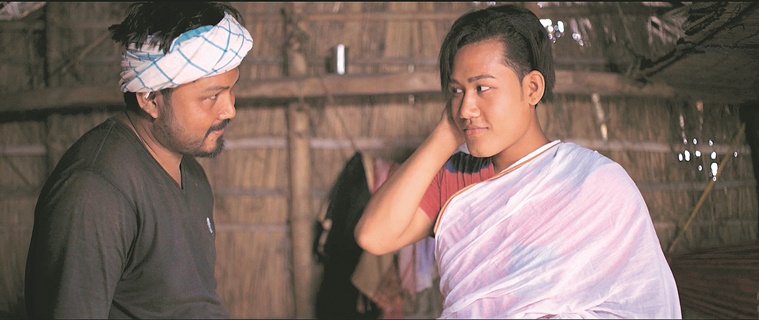‘I don’t believe in labels, but I’m happy to do my tiny bit for the community’: Benjamin Daimary
Assam’s Benjamin Daimary on representing the LGBTQIA+ community in his debut film Jonaki Porua (Fireflies) and winning a National Award
 20-year-old Benjamin Daimary believes life is always what you make of it. Photo Courtesy: Saurav Das
20-year-old Benjamin Daimary believes life is always what you make of it. Photo Courtesy: Saurav DasWhen the news reached him on a languid March afternoon in Mumbai, 20-year-old Benjamin Daimary had just woken up.
“Award…but why?” Daimary wasn’t sure he had heard correctly. At the other end of the phone line was filmmaker Prakash Deka. “What do you mean why? For the film, what else?”
“No…oh my god…what, really?” Daimary said, instinctively turning to the internet to check whether it were true. And there it was — Special Mention: Benjamin Daimary, Jonaki Porua (Fireflies), 67th National Film Awards 2020.
“I checked each letter…B E N J…okay, it’s really me,” Daimary recalls, with a laugh, “And then I shouted…I went like aaaaa…”
It was a shout very unlike the sombre Jahnu (aka Jahnavi), the character he plays in Jonaki Porua (Fireflies), a story that is rarely told in Assamese cinema.
Directed by Deka and produced by LGBTQIA+ activist and trans man Milin Dutta, Fireflies (on MovieSaints) follows the journey of a transwoman, Jahnu, in a bucolic Assam village along the Brahmaputra. But amid the seeming calm, a storm rages. The 16-year-old struggles to come to terms with her identity. It’s a story somewhat similar to Daimary’s own, but the two could not have been more different. Unlike the quiet and shy transwoman Jahnu, the openly gay Daimary is talkative and outgoing. Unlike Jahnu, often worried about what people would say, Daimary seems unaffected by the world at large.
 Directed by Prakash Deka and produced by LGBTQIA+ activist and trans man Milin Dutta, Fireflies (on MovieSaints) follows the journey of a transwoman, Jahnu, in a bucolic Assam village along the Brahmaputra
Directed by Prakash Deka and produced by LGBTQIA+ activist and trans man Milin Dutta, Fireflies (on MovieSaints) follows the journey of a transwoman, Jahnu, in a bucolic Assam village along the Brahmaputra
Yet, the first-time screen actor plays the role with convincing sensitivity — whether it is a moment of stolen joy (when he secretly tries on his sister’s make-up) or a sweet sadness (when, unable to confide in anyone, he confides in the river telling it to take his secret away with it). “I could relate to the character. I was teased and bullied in my village, too. Even in a big city like Mumbai, people sometimes pass a comment,” he says.
Daimary, who grew up in Goreshwar village, 100 km from Guwahati, believes life is always what you make of it. At 10, he knew he was “different” from others around him in school. “I didn’t know I was gay, I didn’t even know the word ‘gay’, but I knew I was not like others,” says Daimary, whose biggest support has been his family. “When I was 13 and came out to my parents, my mother said — ‘Oh, we knew’,” he says, “Even when people would tease me, I’d take it in one ear, take it out of the other.”
It gave him courage to choose his life’s path: fashion, make-up and acting. He’d spend hours obsessing over his idol Priyanka Chopra’s films and “anything fashion” on the internet.
Acting happened by accident. “Acting was for tall and good-looking people, not someone like me!” Daimary says with a laugh. But it changed one day, when he went to drop lunch for his sister at an acting workshop. “I saw all these people my age, laughing, talking, and it looked fun. I signed up for it the next day,” he says, “and realised that you did not have to be tall, fair and handsome to be an actor. You could be short, you could be different, you could be who you are.”
In 2017, the head of his theatre group (Chifung The Artist, led by Pari Sarania, a National School of Drama graduate) told him about a film audition in Guwahati. Daimary, who happened to be in the city, went to “give it a shot,” he says, “I never thought I’d get it.” The next thing he knew, he was the protagonist and had 10 days to prepare. With no time “to meet a transwoman”, he relied on Deka to teach him the ropes and a lesson — “in stage drama, you have to be overly expressive, but for films, you have to tone it down”. Thus, Daimary put that into effect, and, with his own improvisation, transitioned from street plays to camera acting.
The 17-day shoot started on the wrong foot. A fellow actor made an unsavoury comment about Daimary’s personality. “I usually let all this pass, but on that day, it got to me — I was away from home for the first time, in a set full of people I didn’t know. I broke down after the shoot,” he says. The next day, he heard that Deka had asked the actor to leave.
Deka recalls the happy-go-lucky Daimary was “absolutely carefree on the set, dancing around before the shot — but when the cameras rolled, he was someone else, an absolute natural,” he says.
After the film was over last year and with his “make-up work not going well”, Daimary felt creatively stuck. On the insistence of Dimple Saikia, his model-friend in Mumbai, he took off to make a career there. He stayed in Malad, “struggling to make ends meet”. A few gigs came his way — it was tough but fun — until “corona(virus) kicked me out. I’ll go back (home) this month,” he says.
None of his auditions have worked out after Fireflies but Daimary has moved many with his performance. Amid regional awards, recognitions and international screenings in Uganda, the US, and the UK, he bagged the best actor award at the 11th Kashish Mumbai International Queer Film Festival 2020. But it was the National Award special mention that put him in the spotlight. As social media posts calling him the ‘first openly gay actor to have won a national award’ surfaced, Daimary was suddenly flooded with calls from the media.
“Even if I don’t believe in labels, I had no problem if that was the headline I was making. In fact, I loved it. The LGBTQIA+ community rarely gets representation, so even if I am not an activist, I am happy to do my tiny bit for the community,” he says.
Like he does on his Instagram account, too. With make-up tutorials, fashion advice and anecdotal videos about, in Daimary’s own words, “being gay, and loving yourself.”
Photos



- 01
- 02
- 03
- 04
- 05



























